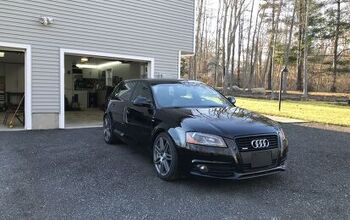Volkswagen of America Launches Zero Emissions Investment Group as Part of Its Punishment

Volkswagen AG has announced a new U.S. unit that will manage its hefty court-mandated investments in zero-emission vehicle infrastructure and green awareness programs.
Electrify America LLC, located in Reston, Virginia, is supposed to be entirely separate from Volkswagen Group’s automotive brands and owned as a subsidiary of VW of America. It will oversee $2 billion in initiatives to promote the use of zero emissions vehicles in the U.S. over the next ten years as part of VW’s diesel emissions settlement.
Reuters reports that Electrify America will make four $500 million investments every 30 months, but must obtain spending approval from the California Air Resources Board and the Environmental Protection Agency. Volkswagen must submit the first round of those drafted plans to the regulators by February 22nd.
According to VW, the initial plan involves installing over 500 charging stations in the U.S., with at least 300 stations situated in 15 metro areas. The remaining stations will be used to establish a cross-country quick-charge network that will help to facilitate long-range driving. There is also to be a “Green City” initiative in a currently unidentified Californian city to test future concepts. Volkswagen anticipates rolling out services like a zero-emissions shuttle service or an EV car-sharing programs.
The company may also decide to spend the money on green education and environmental outreach programs — however, that material is required by the courts to be brand neutral. Volkswagen has also promised the state of California that it would add least three additional electric vehicles to its lineup by 2020 and that it would sell an average of 5,000 electric vehicles per year within state by 2025. It plans to sell 3 million EVs globally within that same time frame.
The world’s largest automaker is expected to plead guilty on February 24th on three felony counts, part of a plea agreement with the United States Justice Department over charges that it knowingly installed emissions-cheating software in U.S. vehicles and falsified testing data.

A staunch consumer advocate tracking industry trends and regulation. Before joining TTAC, Matt spent a decade working for marketing and research firms based in NYC. Clients included several of the world’s largest automakers, global tire brands, and aftermarket part suppliers. Dissatisfied with the corporate world and resentful of having to wear suits everyday, he pivoted to writing about cars. Since then, that man has become an ardent supporter of the right-to-repair movement, been interviewed on the auto industry by national radio broadcasts, driven more rental cars than anyone ever should, participated in amateur rallying events, and received the requisite minimum training as sanctioned by the SCCA. Handy with a wrench, Matt grew up surrounded by Detroit auto workers and managed to get a pizza delivery job before he was legally eligible. He later found himself driving box trucks through Manhattan, guaranteeing future sympathy for actual truckers. He continues to conduct research pertaining to the automotive sector as an independent contractor and has since moved back to his native Michigan, closer to where the cars are born. A contrarian, Matt claims to prefer understeer — stating that front and all-wheel drive vehicles cater best to his driving style.
More by Matt Posky
Latest Car Reviews
Read moreLatest Product Reviews
Read moreRecent Comments
- Lou_BC Synthetic oil for my diesel is expensive. It calls for Dexos2. I usually keep an eye out for sales and stock up. I can get 2 - 3 oil and filter changes done by my son for what the Chevy dealer charges for one oil change.
- Joe65688619 My last new car was a 2020 Acura RDX. Left it parked in the Florida sun for a few hours with the windows up the first day I had it, and was literally coughing and hacking on the offgassing. No doubt there is a problem here, but are there regs for the makeup of the interiors? The article notes that that "shockingly"...it's only shocking to me if they are not supposed to be there to begin with.
- MaintenanceCosts "GLX" with the 2.slow? I'm confused. I thought that during the Mk3 and Mk4 era "GLX" meant the car had a VR6.
- Dr.Nick What about Infiniti? Some of those cars might be interesting, whereas not much at Nissan interest me other than the Z which is probably big bucks.
- Dave Holzman My '08 Civic (stick, 159k on the clock) is my favorite car that I've ever owned. If I had to choose between the current Civic and Corolla, I'd test drive 'em (with stick), and see how they felt. But I'd be approaching this choice partial to the Civic. I would not want any sort of automatic transmission, or the turbo engine.


































Comments
Join the conversation
While the investments may produce an economic value greater than burning $2B in small bills to help generate heat, I'm sure there will be minimal long term positive gain from the expenditures. Forcing someone to invest in a manner acceptable to bureaucrats is only marginally better than having the bureaucrats attempt to manage the money themselves.
Exactly. Those TDI cars were designed to satisfy the requirements. Very smart software was developed to overcome the technological challenges. They passed to test. VW could not read EPA honchos' minds. That was their folly.